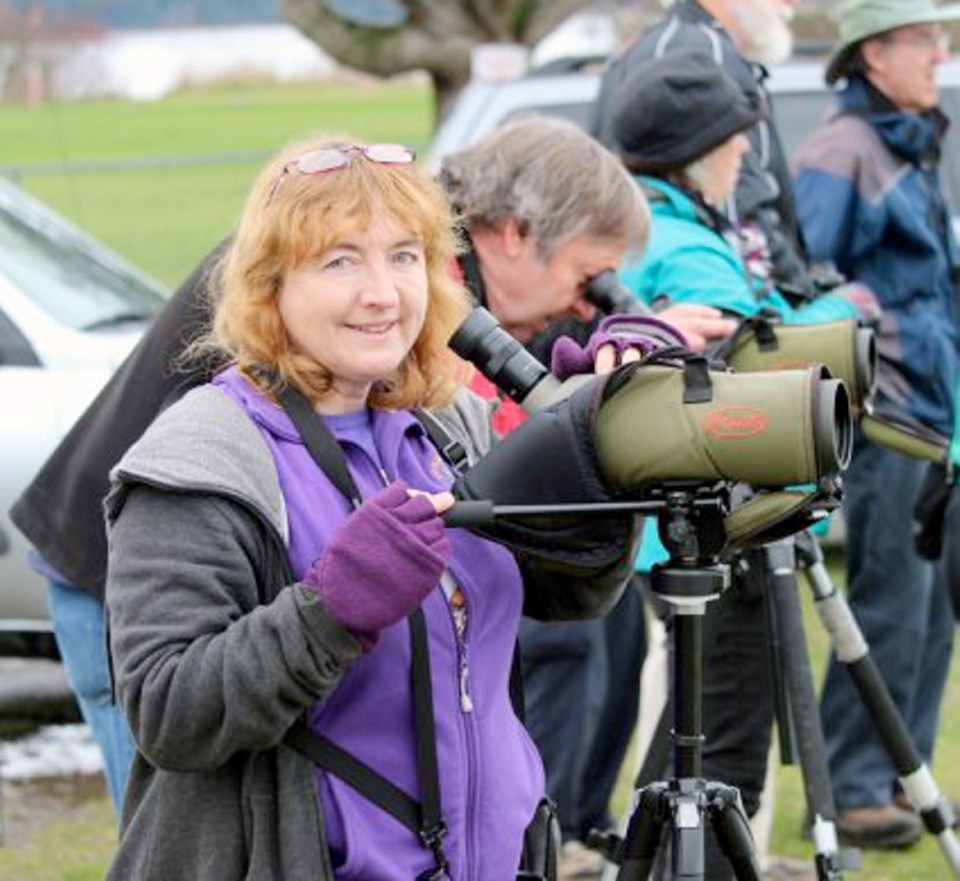For Ann Nightingale, Central Saanich resident and committed birder and naturalist, the human animals who, like birds, are as important as the birds themselves.
“You can go into any community and say: ‘I’m a birder and I’d like to go out,’” Nightingale said. “There are always people to go out birding with.”
“There is a very social aspect to birding,” she said. “You can do it on your own, you can do it two or three friends or you can do it with a large group.”
Nightingale believes her enthusiasm for the sociability of birding, often misidentified as “bird watching,” is likely behind two awards she has recently earned: a Governor General’s Award for Caring Canadians and an award from the American Birding Association.
The Caring Canadians Award is for her volunteer work, mostly done in connection with local conservation and birding. The American Birding Association has granted her the 2016 Betty Petersen Award for Conservation and Community for her outreach, education and liaison work on behalf of birds and birding.
Not bad for a 60-year-old woman, born and raised in Victoria, who has never been away from Vancouver Island for more than 35 days her entire life.
“But I’m known a little bit outside the local birders, as well,” Nightingale said.
A graduate of the University of Victoria, with a B.Sc. in psychology and a master’s degree in public administration, she worked in administration at UVic and Royal Roads and didn’t begin birding until 20 years ago.
Ironically, she had studied biology early on at university and did not do well. She was, however, still interested and decided not to pursue it seriously in school, fearing it might leave her with a distaste for the subject.
But for many years, she bought books and binoculars and read articles. Then, she was lucky enough to find herself working alongside a person who was a keen birder outside the office. One characterization of the enthusiasts is that “birdwatchers look at birds, birders look for birds”; birders thrive on the hunt.
Nightingale was amazed and captivated by how experienced birders could do things such as identifying as many birds by their calls as by their appearance.
Nightingale was also thrilled by keeping count, identifying and observing wild birds that share the same space as people, in the trees, hedges, ponds and backyards.
She fell in with the volunteer migratory bird monitoring station the Rocky Point Bird Observatory, eventually serving as its president and continuing on the board today.
Nightingale has authored two published scientific papers, one on nest predation by male Pacific wrens, something she observed in a nesting bird at her home, and another on the breeding biology of the northern saw-whet owl.
Most recently, she set herself to complete a Birder’s Big Year in 2015 and compiled verifiable sightings of 268 species, all spotted on Vancouver Island. The only previous record Nightingale has found lists 255 species in one year.
She has also become a big enthusiast for using computers and the Internet for keeping track of birds and sightings. Cornell University is operating ebird, which is quickly becoming one of the largest data sources for citizen scientists in the world.
Watching “citizen science” in action gave Nightingale her biggest personal bird revelation. At the Rocky Point Bird Observatory, she saw some banders recording the capture of a bird, for the fifth year in a row.
“That was a real pivotal moment for me,” she said. “Prior to that I had always thought of birds as something just passing through.”
“But birds are as loyal to their habitat as we are,” she said. “So if we take out that habitat to build something, what will happen to the birds?
“We don’t even know the answer,” Nightingale said.
rwatts@timescolonist.com



